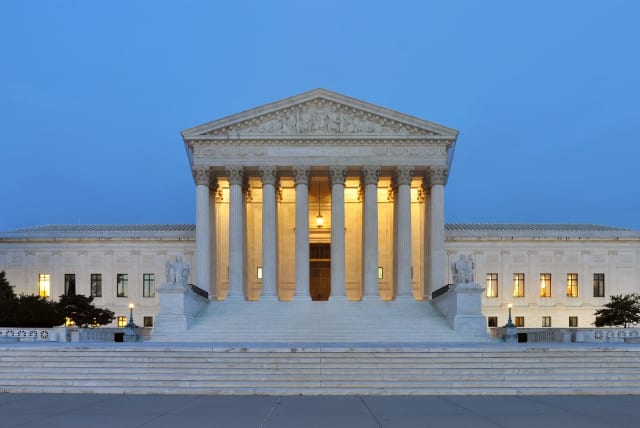US justice has been hijacked by Middle East politics - opinion

When a judge acknowledges that foreign policy is not in the purview of his role, he should act accordingly. Yet, in this case, White did not.
The gates of justice are only as mighty as their gatekeepers, the judges. Last month, the American judiciary suffered a setback when Federal District Court Judge Jeffrey White released an order in Defense for Children Int’l Palestine v. Joseph R. Biden. Here, the plaintiffs sought to stop the Biden administration from providing further military aid to Israel by filing a preliminary injunction.
Despite correctly dismissing the case and denying the request for an injunction, White exceeded the bounds of his authority as a judge by issuing an order replete with judicial activism and undue foreign policy commentary on Israel’s defensive war in Gaza.
At a time when the judiciary has become increasingly subject to rebuke and concerns of politicization, judges have a moral duty to execute their job professionally in order to restore the public’s faith in their independence, impartiality, and competence. At a minimum, White should apologize for his unprofessional conduct that has surely harmed the public’s already soured perception of the court’s credibility.
Recent polls suggest “a striking loss of confidence” among Americans in their judicial system. Opinions on the Supreme Court (SCOTUS) subsided to record lows, with 54% of Americans sharing unfavorable views towards it in 2023, views that surely project onto SCOTUS’s subsidiaries – Federal District Courts.
Now more than ever, judges must restore faith in a system that many Americans feel has failed them. When a judge acknowledges that foreign policy is not in the purview of his role, he should act accordingly. Yet, in this case, White did not.
Despite first recognizing that the judiciary should not comment on questions of foreign policy, he seemingly defied the very standards he set out, offering unsolicited political commentary and a politically motivated call to action.
Ruling on a foreign conflict isn't within White's jurisdiction
nAt first, White notes, “Foreign policy is constitutionally committed to the political branches of government, and disputes over foreign policy are considered nonjusticiable political questions… The foreign policy decision whether to provide military or financial support to a foreign nation is 'a quintessential political question’ and likely ‘inappropriate for judicial resolution.’”
Despite deeming foreign policy as a matter usually off-limits for judicial comment, White opines, “It is every individual’s obligation to confront the current siege in Gaza, but it [is] also this Court’s obligation to remain within the metes and bounds of its jurisdictional scope.” He also notes that plaintiffs’ testimony, among other statements, “indicates that the ongoing military siege in Gaza is intended to eradicate a whole people” and “plausibly falls within the international prohibition against genocide.”
White’s views—however incorrect they may be—are difficult to reconcile with the very case law he cites, which notes, “It is not the role of the courts to indirectly indict Israel for violating international law with military equipment the United States government provided and continues to provide” (see Corrie v. Caterpillar, Inc.). Yet, White’s flawed comments could reasonably be perceived as an indirect indictment of Israel being issued in his capacity as a judge.
White should also have been more circumspect before commenting on a subject matter on which he had only heard from the plaintiffs. In part, this is because the defense counsel’s argument did not directly address the plaintiffs’ accusations, which allege Israeli siege or genocide, on the merits. Surely, this is because those accusations were irrelevant to the case, which was dismissed on grounds of jurisdiction.
As an already contentious case, with the plaintiff team including Al Haq, an NGO designated as a terrorist group by Israel, White’s decision to express his sympathies with the plaintiff team’s politics could have offended Americans and America’s allies in Israel and potentially strained US-foreign relations. In bearing the color of the US government, White ought to respect the Constitution’s separation of powers and leave foreign policy judgments to the executive branch.
Simply put, justice cannot prevail in a system that privileges and ignores the misdeeds of a certain class, judges included. Judge White’s unwarranted statements might have crossed an ethical line.
After all, the Code of Conduct for US Judges contains multiple canons concerning judicial ethics whose essence could raise questions concerning White’s conduct. See, for example, Canon 1, which instructs judges to “Uphold the Integrity and Independence of the Judiciary”; Canon 2, which instructs judges to “Avoid Impropriety and the Appearance of Impropriety in All Activities”; and Canon 3, which instructs judges to “Perform the Duties of the Office Fairly, Impartially and Diligently.”
In sum, White’s unsolicited and extraneous accusations and his call to action against Israel compromised his court’s appearance of objectivity and surely fueled existing concerns regarding the judiciary’s politicization, prejudices, and abuse of judicial activism. For the sake of the public’s faith in our justice system, he should apologize and refrain from using his bench for anything other than the swift administration of justice.
The writer is an attorney and the director of policy education at StandWithUs, an international nonpartisan organization that combats antisemitism and misinformation about Israel.
Jerusalem Post Store
`; document.getElementById("linkPremium").innerHTML = cont; var divWithLink = document.getElementById("premium-link"); if (divWithLink !== null && divWithLink !== 'undefined') { divWithLink.style.border = "solid 1px #cb0f3e"; divWithLink.style.textAlign = "center"; divWithLink.style.marginBottom = "15px"; divWithLink.style.marginTop = "15px"; divWithLink.style.width = "100%"; divWithLink.style.backgroundColor = "#122952"; divWithLink.style.color = "#ffffff"; divWithLink.style.lineHeight = "1.5"; } } (function (v, i) { });

